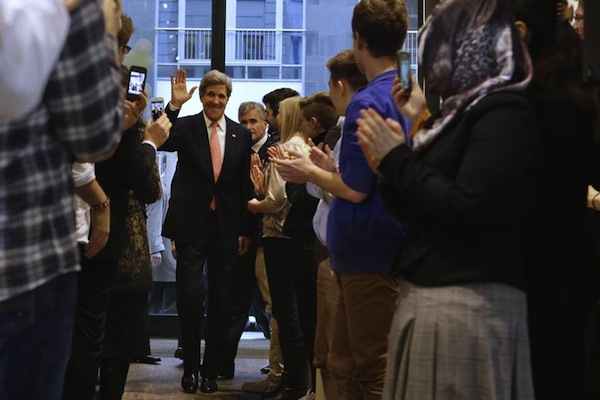
Secretary Kerry in Berlin. Source: AP/Boston Globe
With Secretary Kerry currently traveling on his inaugural trip overseas as secretary of state, the Pew Center has compiled data on public opinion of the U.S. in the countries that he is visiting. Public opinion in the various countries on his agenda (though Qatar, Saudi Arabia and Abu Dhabi were not in the Pew report) is as follows, reflecting updated data from spring 2012:
- Britain: 60 percent favorable. Since 2002, the high point in British perceptions of the U.S. was in 2002 (75 percent favorable) and the low point was in 2007 (51 percent favorable), data that likely reflects changing public perceptions of the war in Afghanistan.
- France: 69 percent favorable. Since 2002, the high point in French perceptions was in 2009 and 2011 (75 percent favorable) and the low point was in 2004 (37 percent). France was never known for its enthusiasm for the George W. Bush administration or for the war in Iraq.
- Germany: 52 percent favorable. Since 2002, the high point in German perceptions was in 2009 (64 percent) while the low point was in 2007 (30 percent).
- Italy: 74 percent favorable. Fewer years of data were available for Italy than for the other European countries, but for what is available, since 2002, the low point was in 2007 at 53 percent and the high point was in 2012 at 74 percent.
- Turkey: 15 percent favorable. The Turkish public has not had a particularly favorable impression of the U.S. in the past ten years. Since 2002, the high point in perceptions was in 2002 and 2004 (30 percent) while the low point was in 2007 (9 percent), with a close low in 2011 at 10 percent.
- Egypt: 19 percent favorable. Data was available only for 2006 onward, but the high point in Egyptian perceptions was in 2006 (30 percent favorable) while the low point was in 2010 (17 percent favorable).
These differences between countries in public opinion toward the U.S. are substantial, to say the least. In the European countries, the topics up for discussion include bilateral relationships and the security situations in Syria and Mali. In Turkey, as Pew states, Mr. Kerry will discuss “discuss regional stability, counterterrorism cooperation, and the U.S.-Turkey relationship,” while the visit to Egypt will focus on that country’s economic and political challenges.
As for the U.S. context for Secretary Kerry’s trip, it is clearly a time of deep frustration in America with political gridlock and a sub-par economy; the sequester is on our heels. Foreign affairs funding often comes under criticism, and this year is no exception, with fatigue over the war in Afghanistan and disenchantment with the legacy of the Arab Spring compounding fiscal concerns. Some ask, is U.S. foreign assistance worth continuing in light of our own domestic challenges?
These are the kinds of retreat-from-the-world impulses that Secretary Kerry — who is also a strong champion for bolstering the domestic economy — is trying to counteract, arguing that foreign assistance and a vibrant U.S. economy are inextricably linked. At the University of Virginia last week, Kerry passionately made the case for the importance of funding foreign assistance, pointing out that the foreign affairs budget (around one percent of the national budget) is miniscule compared to the amount that many Americans believe it to be (25 percent). (For more analysis on Secretary Kerry’s speech, please refer to fellow FPA blogger Damien Tomkins’ recent post). As he remarked at UVA, it is critical that fellow Americans understand the importance of U.S. foreign assistance:
Now, my friends, in this age, when a shrinking world clashes with calls for shrinking budgets – and we’re not alone – it’s our job to connect those dots, to connect them for the American people between what we do over there and the size of the difference that it makes over here at home, why the price of abandoning our global efforts would be exorbitant, and why the vacuum we would leave by retreating within ourselves will quickly be filled by those whose interests differ dramatically from ours.
Kerry went on to reinforce the idea of foreign assistance as necessary for a more prosperous United States:
Let me be very clear. Foreign assistance is not a giveaway. It’s not charity. It is an investment in a strong America and in a free world. Foreign assistance lifts other people up and then reinforces their willingness to link arms with us in common endeavors. And when we help others crack down on corruption, that makes it easier for our own compliance against corruption, and it makes it easier for our companies to do business as well
Secretary Kerry’s trip overseas is the first of many; his time over the next four years will include not only navigating pressing international issues but also explaining to the American public why foreign affairs funding is critical. In many corners of the world, the United States faces a crisis of public opinion, but it is not just abroad where public opinion of U.S. conduct on the international stage matters deeply.